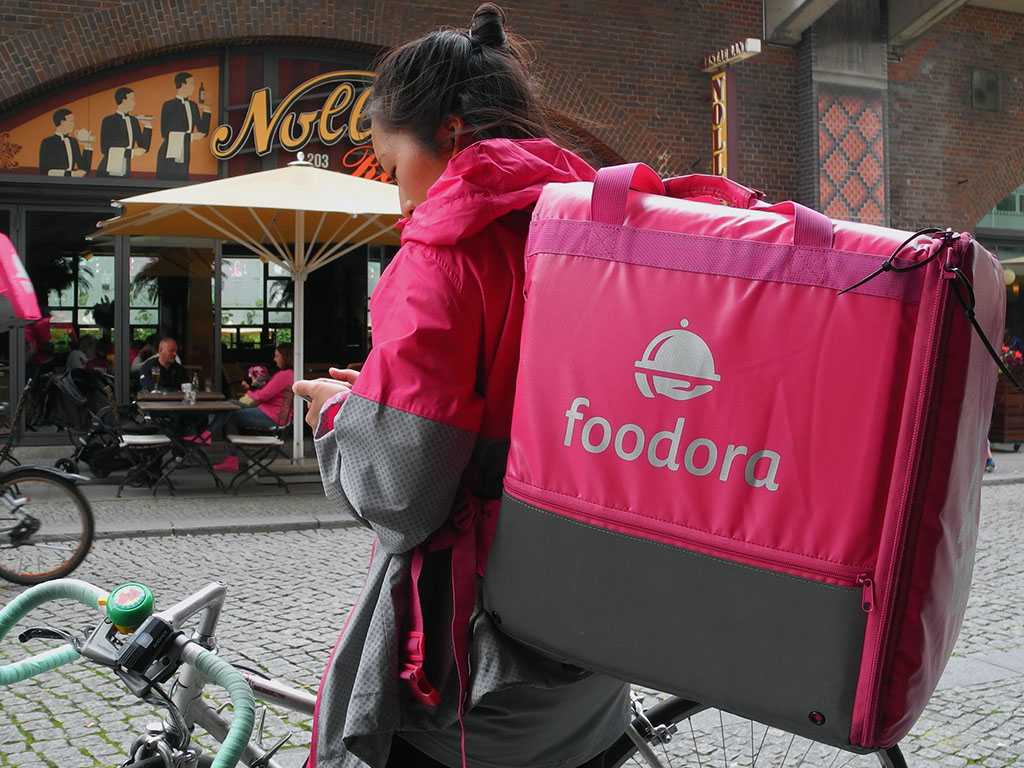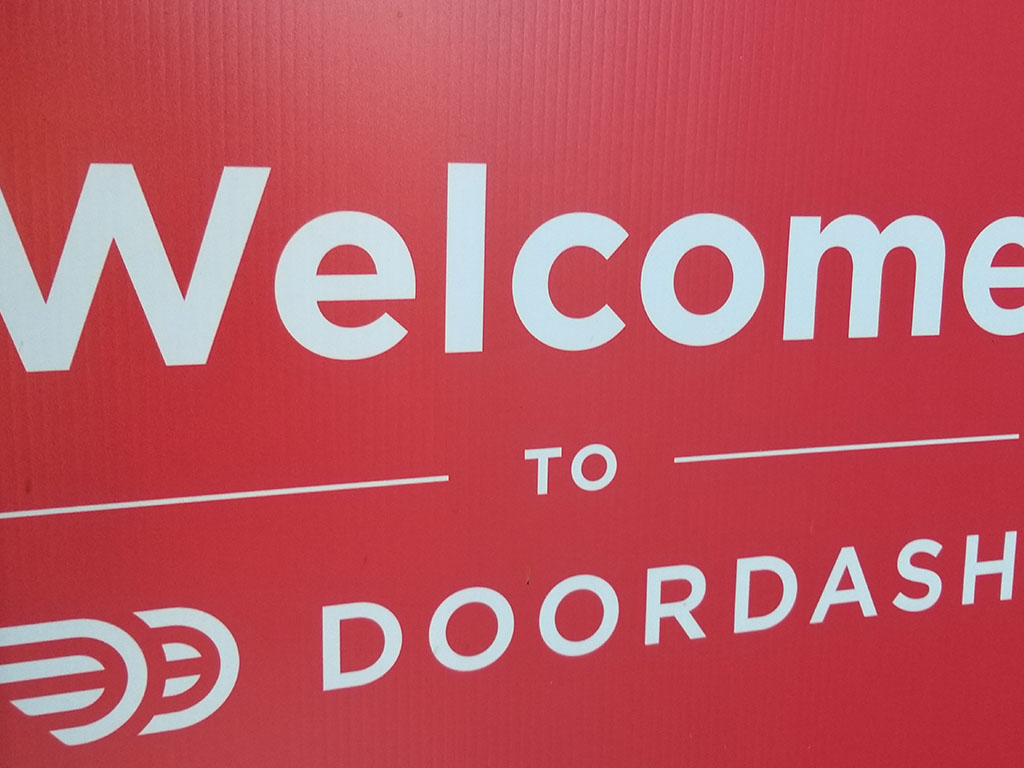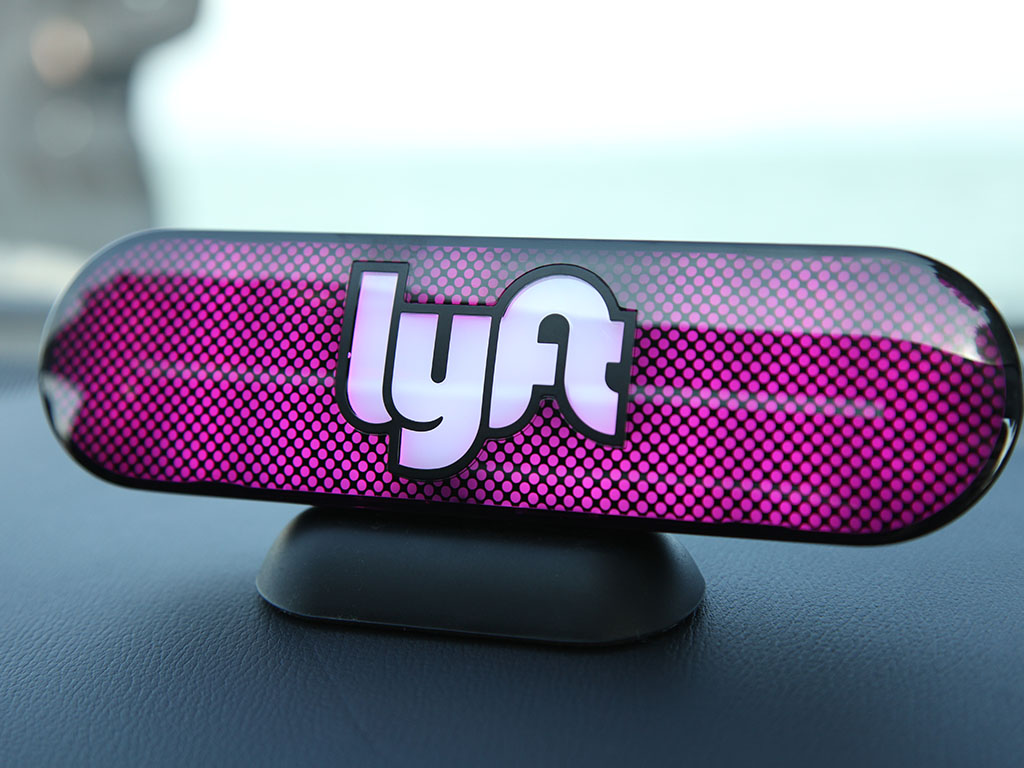Ride sharing and delivery apps like Uber Eats, Foodora, Skip the Dishes and Lyft have changed the way Canadians order food and get around.

While many of these startups have helped users access more affordable rides or have any type of meal delivered to their doorstep, they’ve come at a cost.
In recent months, workers for service apps have mobilized to protest inadequate pay and unsafe working conditions.
WATCH BELOW: Protesting Uber and Lyft drivers take to the streets in NYC

On May 8, U.S. Lyft and Uber drivers went on strike on to protest what they call declining wages, arguing that ridesharing apps are raking in billions of dollars while workers are struggling.
In Canada, Foodora bike and car couriers recently announced their plans to unionize with the Canadian Union of Postal Workers, demanding better working conditions and job protection.
In other words, workers and labour advocates are highlighting aspects of the gig economy and trying to raise awareness of the reality of precarious work.
READ MORE: Gig economy could be dragging down wages for everyone — even those with regular employment
So what is it like to work full-time or part-time for a service or delivery app? While Foodora, Lyft, Instacart, DoorDash and Skip the Dishes are in many cities in Canada, Global News spoke to Canadians who work for these companies around the G.T.A. and asked them how much they really earn, their biggest challenges and the realities of the gig economy.
Here’s what they said.
Alexis Burger, Instacart shopper
Average hours worked per week: “I am a full-service shopper, which means I receive the grocery order (we call it a batch) on my Instacart app, then I go to the store to shop the order, and deliver to the customer’s address. Shopping the order is just what it sounds like — the shopper goes around the store to find the various items in the customer’s order.
WATCH BELOW: Ride share service Lyft set to go public

As for my day-to-day, I am typically available to accept batches between eight and 12 hours per day, seven days a week.”
In February 2019, Instacart admitted that they were in the wrong, and issued a back payment to all shoppers affected by the less-than-honest pay methods. They released another new pay structure — and guaranteed an Instacart payment minimum of $7-$10 depending on the zone, plus tips. It’s even worse now than it was with the first new pay structure, with some small orders paying $7 to drive to the store, shop and deliver for no tip.
READ MORE: The gig economy is making cash flow management a nearly impossible task
I average about $400 per week with between 15-18 accepted batches, but I am offered 40+ batches weekly. I choose not to accept batches under $15 unless they are close to my location and will take me less than half an hour to complete. I’m not going to drive across the city for $7.
Before the new pay structure, I made an average of $1,000 with between 25-30 batches per week.”
Perks of the job: “When I started shopping, I quickly realized I loved it. I love the customer interaction, using my social skills with the elderly and disabled people who use the services, and being able to meet a practical, tangible need for people. I also enjoy the personal competition. I’m always working hard to meet and beat my personal bests as far as speed and number of batches in a given week.”
Downsides of the job: “What I dislike most is the shady business practices of Instacart… I don’t feel that Instacart cares about its shoppers. We are expendable, and I think they’re trying to force the veteran shoppers out and over-saturate the market with new shoppers who don’t know that Instacart actually used to be livable.

Get weekly money news
WATCH BELOW: Uber falls in biggest U.S. market debut since Facebook

I also don’t like that customers have the ability to change their tip for three days after delivery. What other industry would allow that? Imagine eating at a restaurant, tipping and then deciding three days later that the food wasn’t as tasty as you wanted so you go back to the restaurant and demand the waitress pay you back the tip? It’s ridiculous.
Ivan Ostos, Foodora bike courier
Joined: “Three years ago.”
READ MORE: 7 ways to file your taxes for free in Canada
Any expenses or personal costs: “You’ve got to have your own bike, so there’s an upfront cost, and you have to pay for the maintenance of that bike. There’s no sort of insurance if your bike gets stolen, so if you want to have insurance, that comes out of your own pocket. There’s also no general insurance in case you get injured off the job.
There’s also clothing. Being a cyclist, if you’re working every day, you want to have adequate clothing so that you’re comfortable, sanitary and look professional.
WATCH BELOW: Quebec to inject $500 million in taxi industry

For delivering food, you need a backpack. With Foodora, it used to be that you paid a deposit for their own backpack that was around $50. I don’t think it actually works like that anymore. I think that you just pay outright or you have to have a backpack of your own that’s adequate. It has to be big enough to fit food like pizza boxes, and insulated so food is protected. Those are expensive; one I had was $400.”
Downsides of the job: “It’s really hard to budget. You become very financially savvy doing this job because if you’re not, you’re not going to make it.
The union takes up a lot of my time, and I don’t really get paid for that. I’m trying to just make enough money to get by while maintaining my work effort in this struggle.
READ MORE: A ‘layoff fund’ can prevent a bad situation from becoming worse
This unionization drive is specific to Foodora; that’s who we’re targeting and that’s the workforce we’re trying to unionize right now. That being said, we understand that this is a microcosm of a bigger issue in our society. We understand that all of these food delivery companies basically operate under the same premise that we’re independent contractors, so we’re not entitled to the rights and benefits that others are supposed to get. They are taking advantage of that.”
Praneet, Foodora, Skip the Dishes, DoorDash delivery driver
Joined: “Four months ago.”
Average hours worked per week: “I have been working full-time, but gradually reducing the number of hours I do. On an average week where I work around 55 hours spread across seven days, I average between 90 and 100 deliveries a week.”
Average weekly earnings: “Between $1,000 and $1,200, which is including tips. Foodora guarantees a minimum hourly pay. Others do it based on delivery.”
Tips?: “It varies a lot. Most people don’t tip.”
WATCH BELOW: Staff report says it’s ‘inevitable’ that Uber, Lyft will come to Halifax
_848x480_1437141571935.jpg?w=1040&quality=70&strip=all)
Perks of the job: “When I first joined, I was excited because I really enjoy driving. But gradually, the excitement weaned off. The flexibility of doing a particular delivery is nice. If you think location is far, or unsafe, you can unassign yourself. On busy days and busy hours, you get paid more with apps like DoorDash.”
READ MORE: How high on the income ladder do you need to be to afford a home in Canada?
Driving takes a huge toll on your car. Especially around downtown — where parking is limited or null in some cases — you’re expected to park illegally and then get the food and leave. The delivery companies need to find a workaround to this as the parking authority guys give you tickets left right and center.
Derek Latif, Lyft driver
Joined: “December 2017. I was a founding driver, so that means I was one of the first 4,000 that signed up.”
I was driver of the year for Lyft in 2018. I typically drove afternoon rush hours, some evenings, and then Fridays and Saturday night. I would do around 75 to 100 rides a week last year.”
WATCH BELOW: Ride-sharing service Uber opens on the New York Stock Exchange

Average weekly earnings: “On average, I make about $20-$30 dollars an hour at the end of the week. It all depends on what’s going on that week whether there’s holidays and so forth. But generally, I would say at least $25 an hour a week, including tips.”
Tips?: “We don’t get off a whole lot of tips; I make about 10 per cent in tips and that’s typically a good week. I’d say only 20 or 30 per cent of the riders actually end up giving you a tip.”
READ MORE: Canada’s labour market posts largest monthly jobs gain since 1976
Any expenses or personal costs: “Gas is the biggest cost. It’s about a half a tank of gas for me for every six to eight hours of driving.”
Downsides of the job: “Intoxicated passengers. I would say that is the biggest challenge — keeping your service level up while you’re getting badgered by passengers.”












Comments
Want to discuss? Please read our Commenting Policy first.